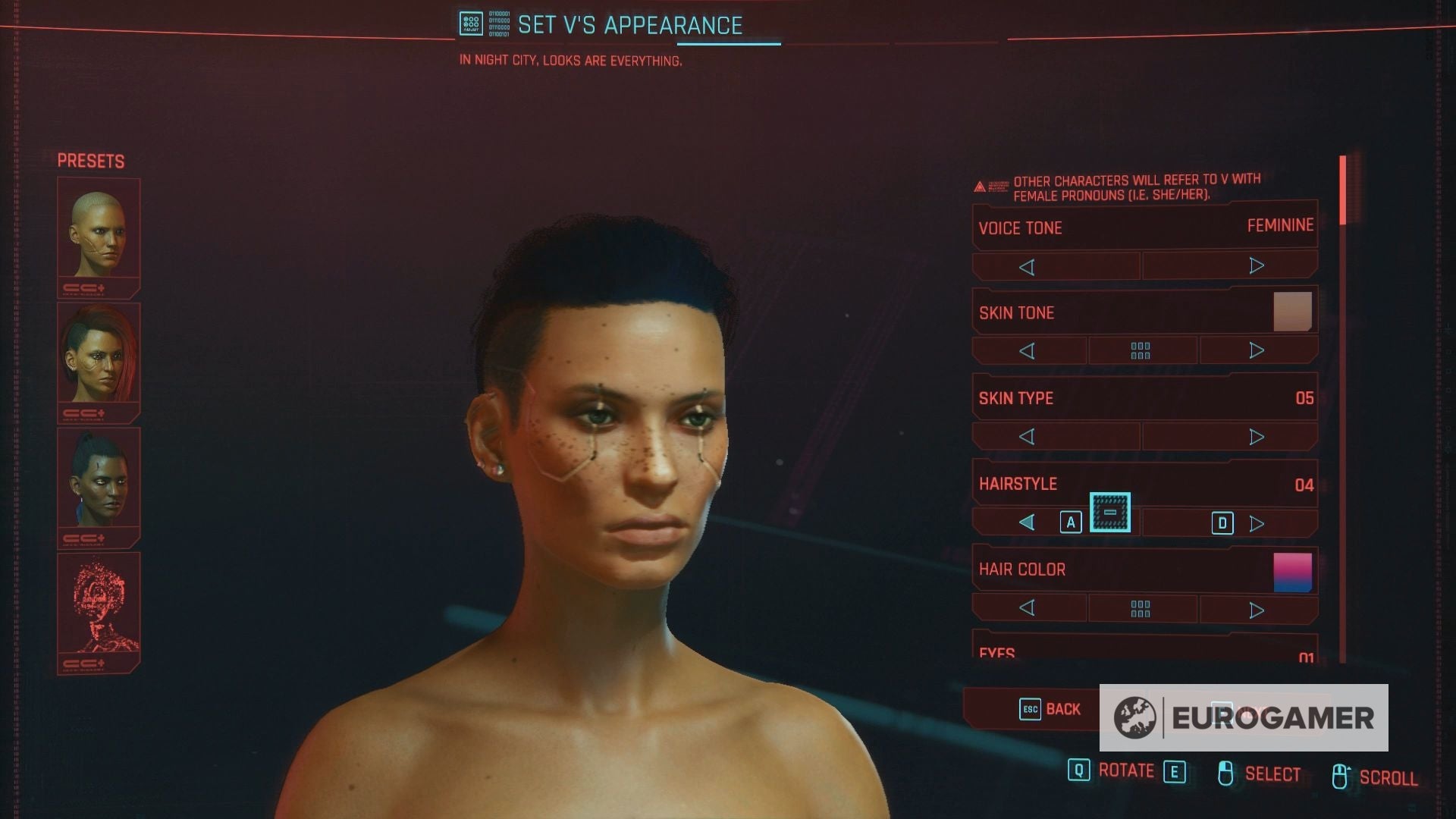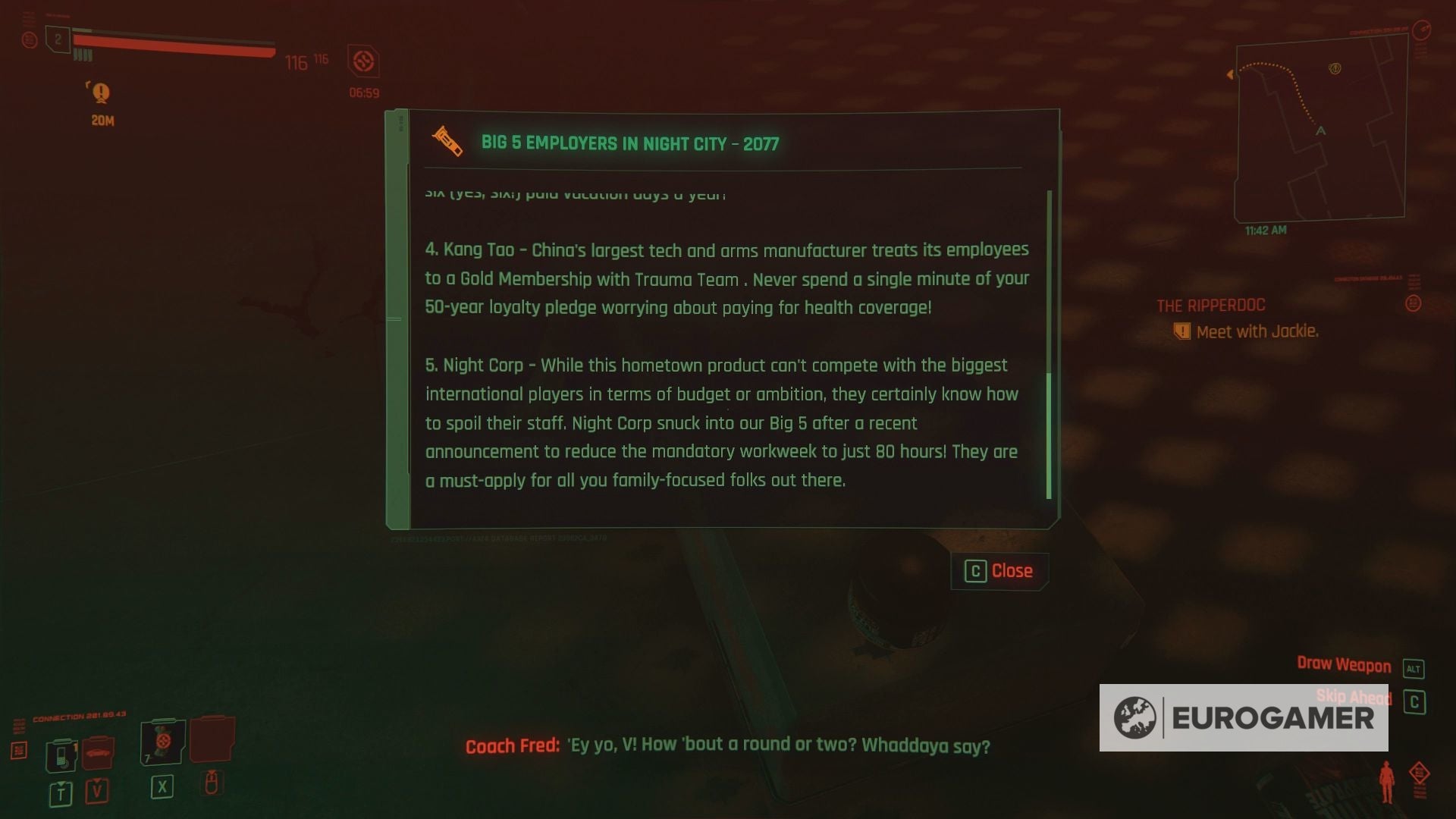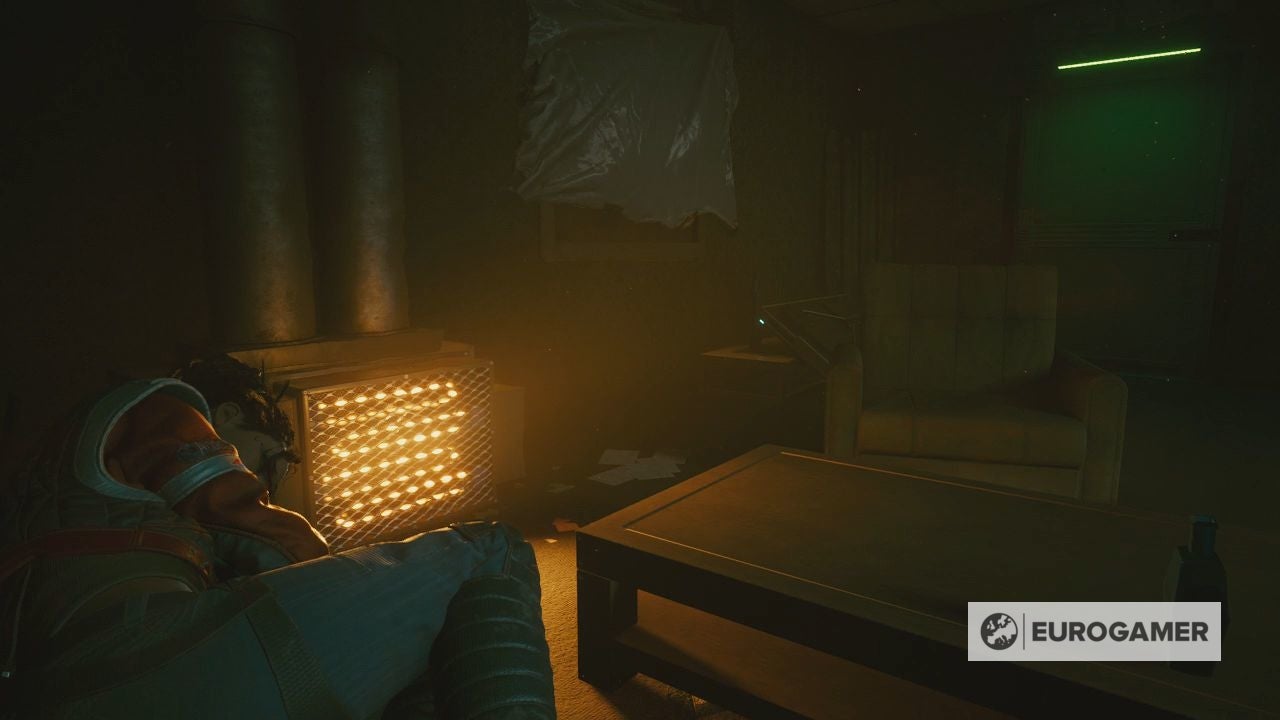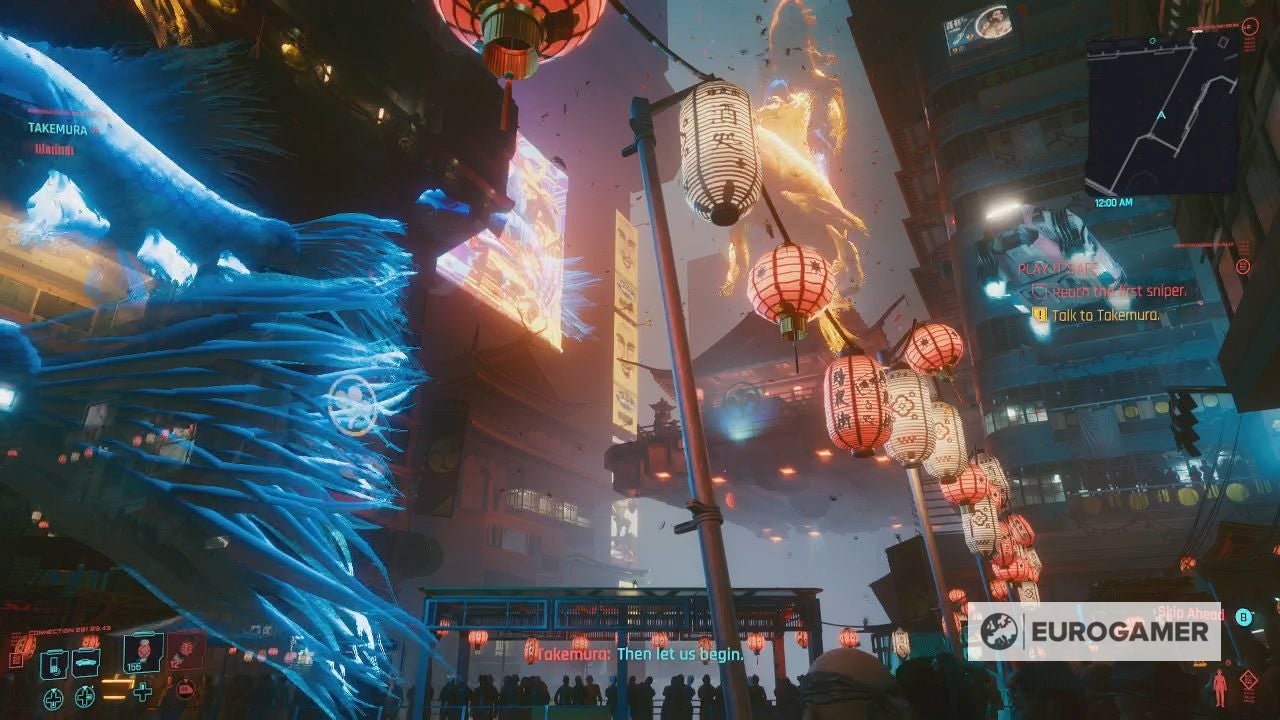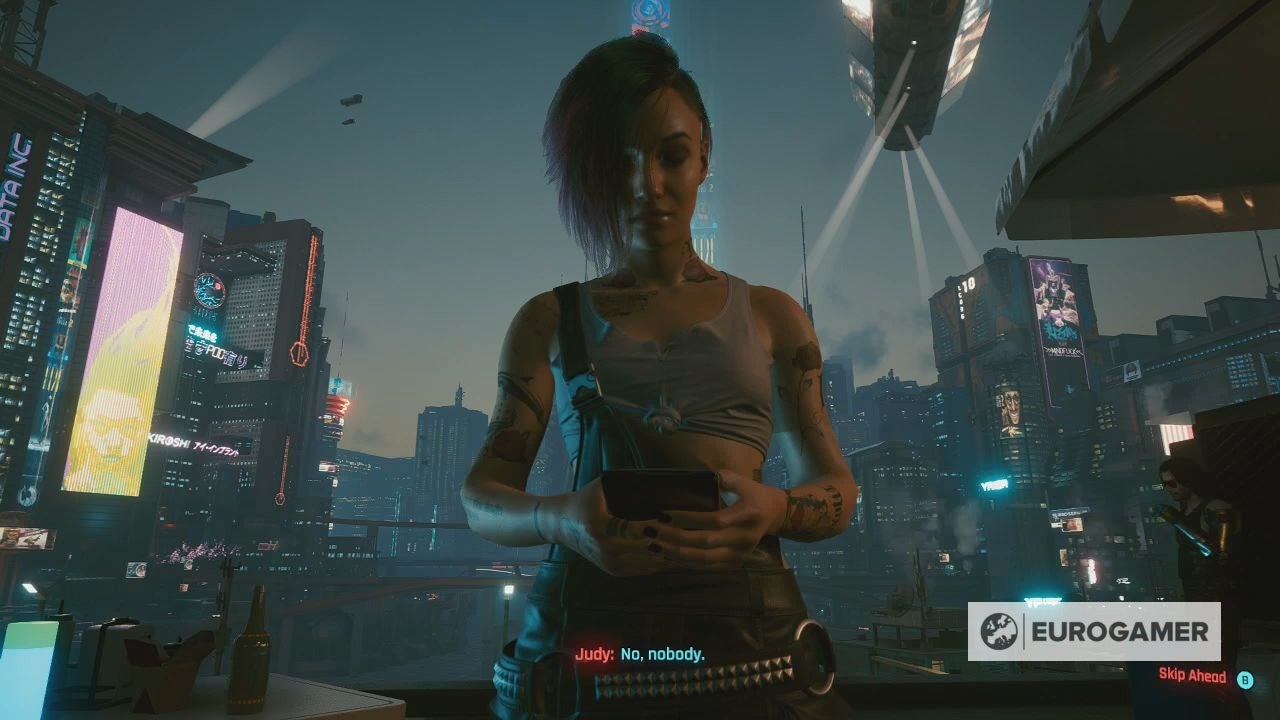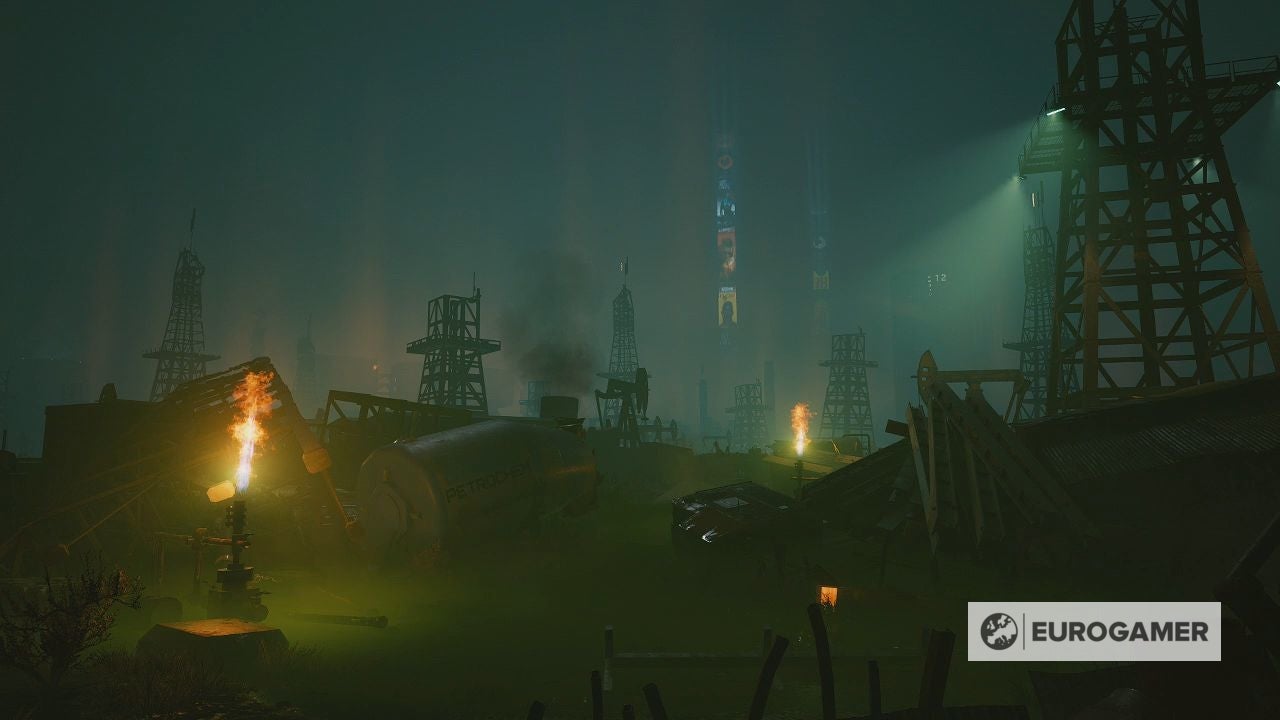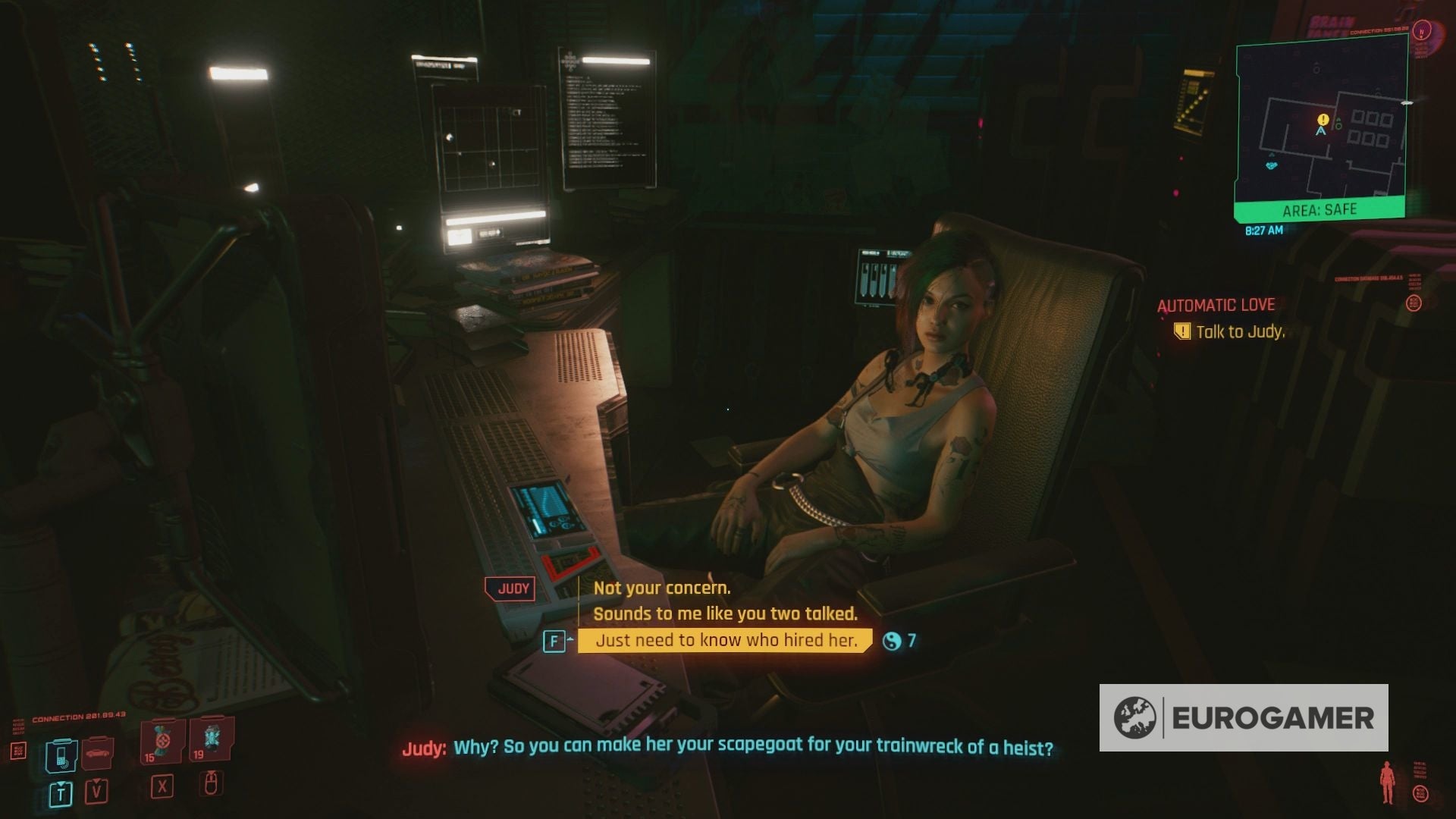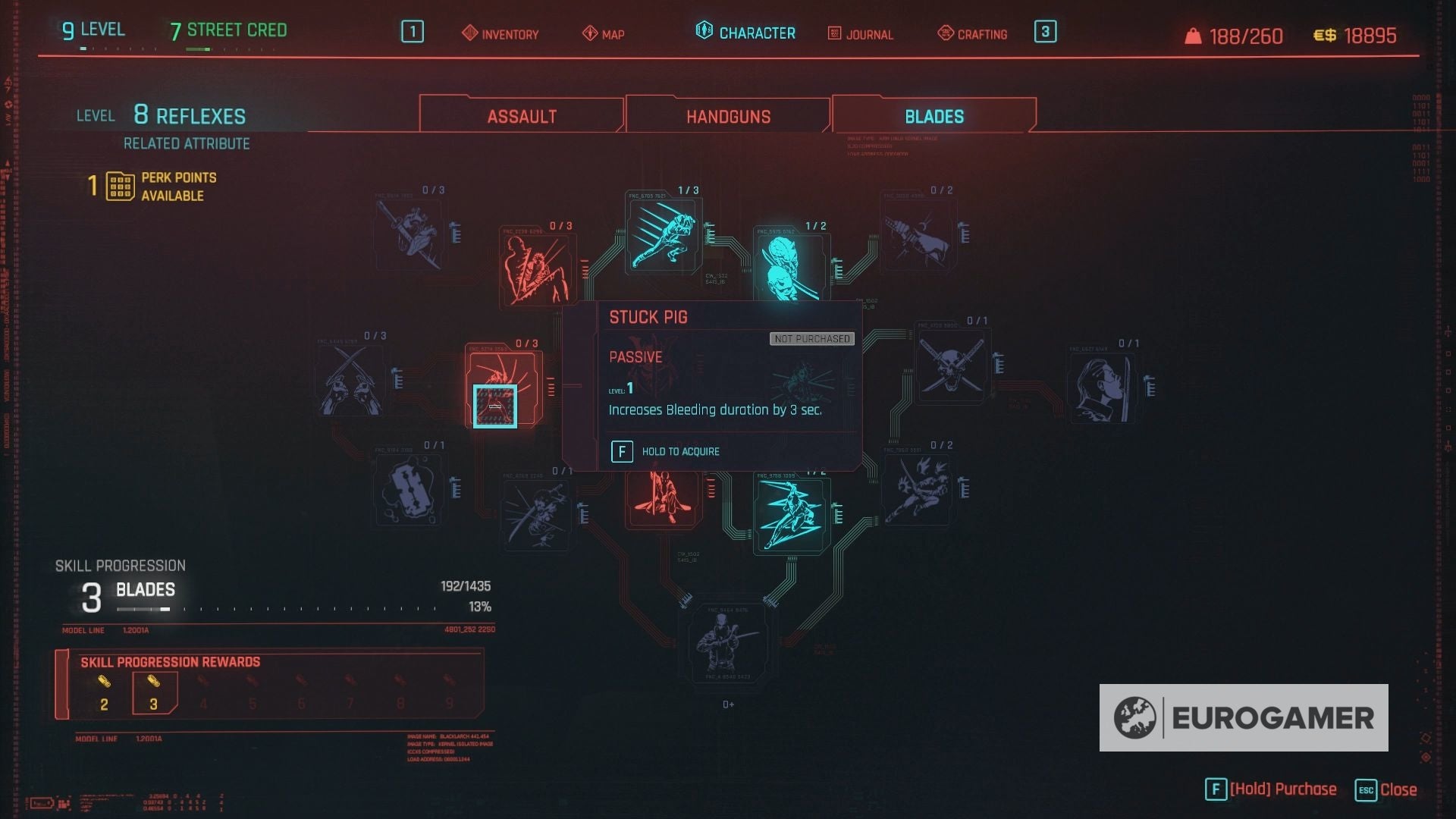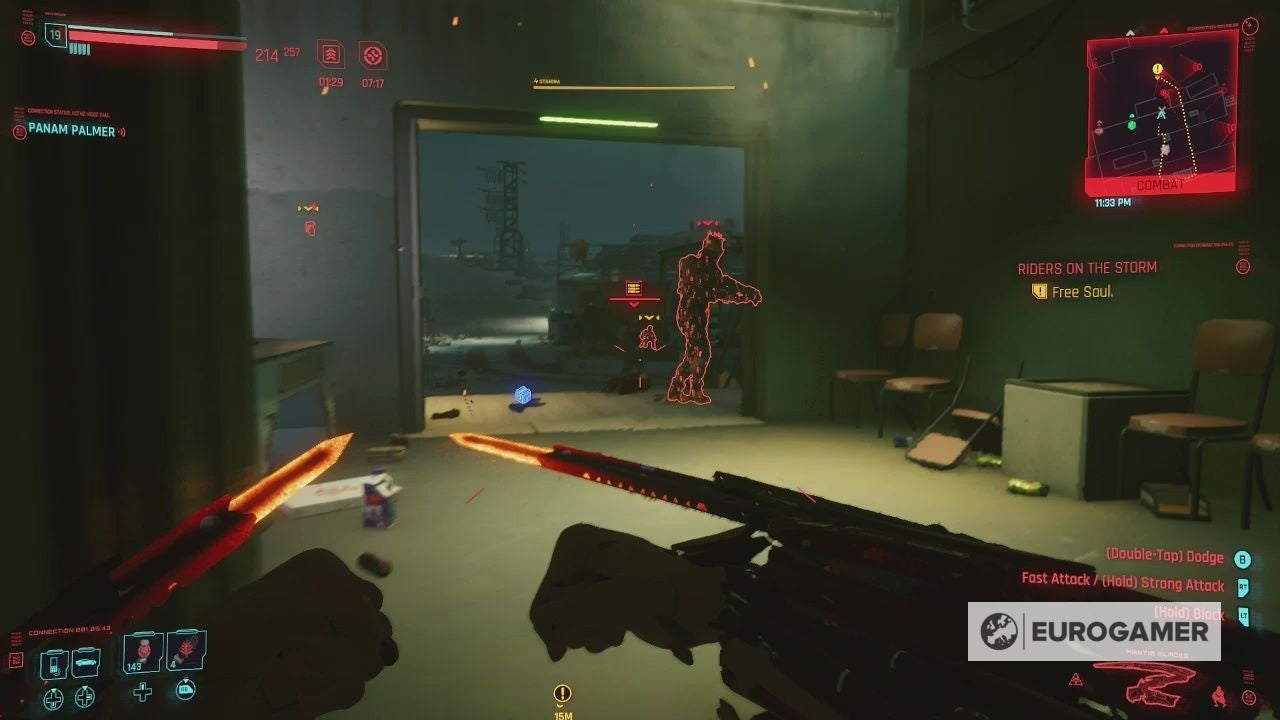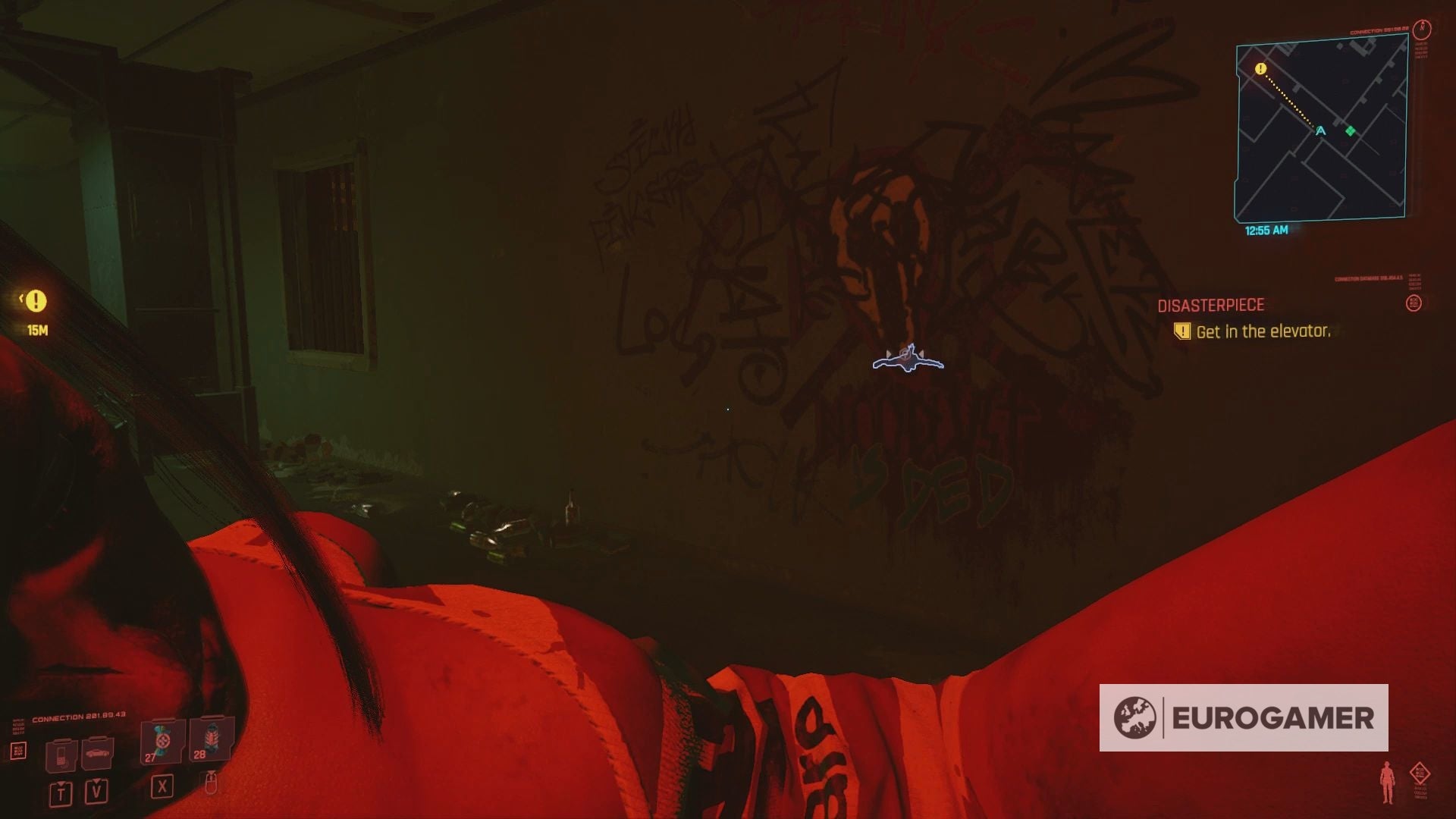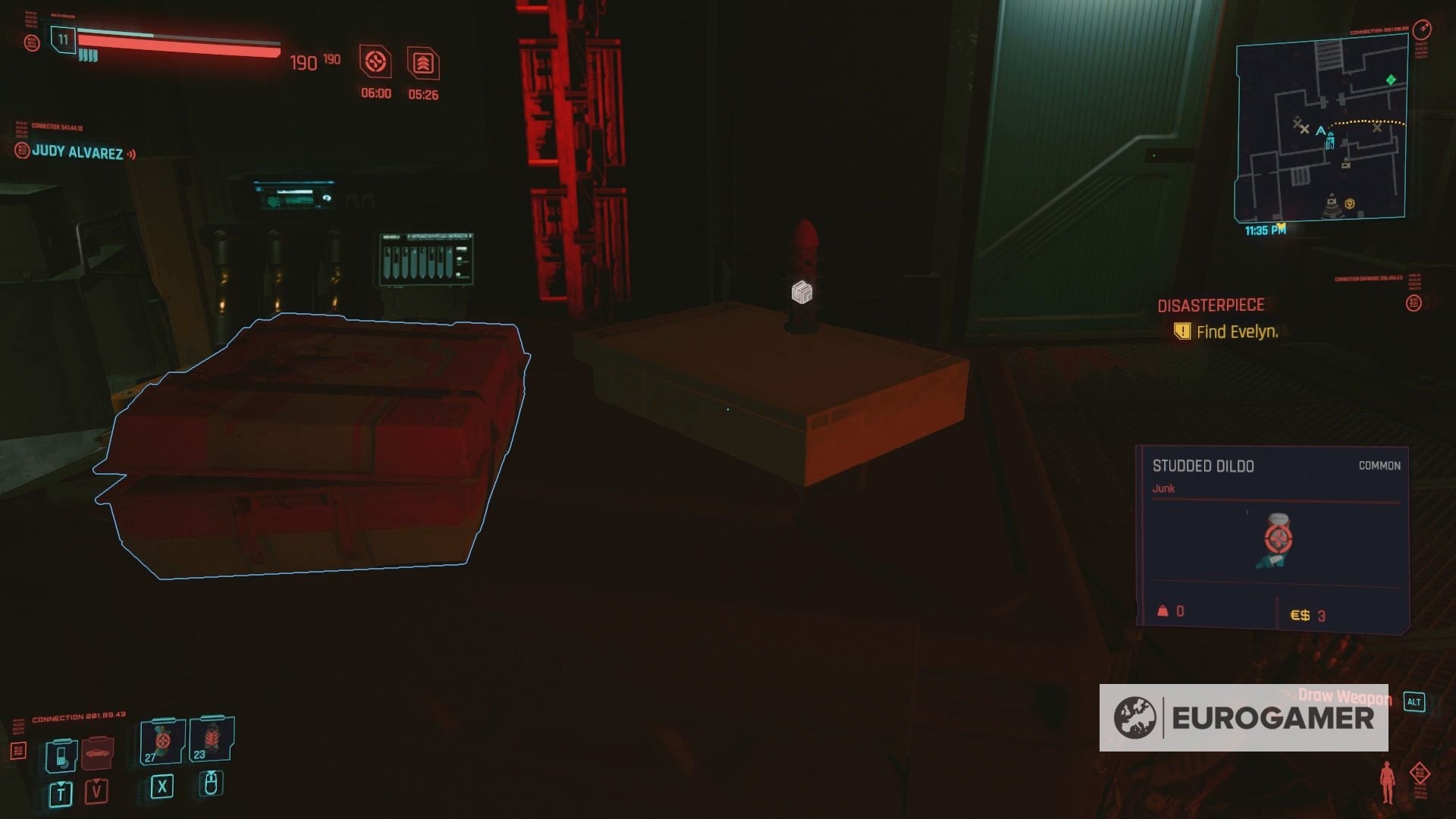Even putting the human cost aside, it is an enormous shame. As much as the excitement has been at times irresponsibly over-fanned, Cyberpunk 2077 is a game of vast ambition. It’s driven by a core of characters wonderfully written and performed, a story of genuine layer, momentum and depth, a technical feat of immersive decision-making, and pumping, sim-inspired action. But the undeniable potential is drowning under the tidal wave of little issues. An uncharacteristic carelessness to the finer points, some pervasive immaturity of thought, and distracting, recurring bugs leave Cyberpunk 2077 as a game in conflict: a world of unmatched detail, in dire need of attention. But how I love it, nonetheless. Cyberpunk 2077 follows CD Projekt’s trend for adapting its games from the grittier kinds of genre fiction. As The Witcher games drew heavily from Andrzej Sapkowski’s Polish fantasy novels, Cyberpunk 2077 does from Mike Pondsmith’s Cyberpunk, a 1988 tabletop RPG. The result is a strong emphasis on immersion at all costs, a slightly of-its-time tone, and far greater choice in what you can do and how you can do it than in any of the studio’s previous games. You play as V, starting with a choice between three ’life paths’ that dictate your background and what happens to you in the first four or five hours of the game, as well as providing you with occasional life path-specific dialogue prompts throughout. It’s a neat idea, but the real consequence of it is hard to tell - for me, playing V as a woman with a ‘Corpo’ life path, it served as a fun jump-off for some very light, conversational role-playing as a once-vicious power broker now fallen from grace (think Luv, of Blade Runner 2049, if Wallace gave her the boot), but that was about it. The role-playing is focused, sticking to depth of choice through your personality, your decisions, and your plan of attack, but notably not the breadth of things to do - no guilds or playstyle-specific pseudo main-quest stories like those of The Elder Scrolls, or an MMO. You also begin with a deep, if somewhat overcompensating character creator. The customisation is equal parts fantastic and ridiculous, and a good look at CD Projekt’s conflicted approach in microcosm. There are wonderful, microscopic details to hair and fingernails and scarring - and also half a dozen penis options, choices for breast size and the diameter of your areola. There are just the two genders, mind, and, in the game’s words, the pronouns people will use for you in-game are dictated by your voice - an oddly prudish and self-defeating decision, that’s clumsy at best and sits at odds with the world itself, making for one where everyone can modify their limbs and eyeballs and sub-dermalogica membrane at will, but god forbid anything else. The world CD Projekt has sought to create with Cyberpunk 2077 is everything, of course. Few games in my memory have sparked such intense and interesting discussion of genre, and in cyberpunk dystopia is inseparable from the genre itself. And what a beast Cyberpunk 2077’s dystopia is. Night City is a monster. A putrid, monolithic, contemptible, shrieking hellhole and monument to maximalism, the temptation is to view it in isolation as just that: a horrible world created as a kind of hyped-up, GTA-style pastiche (and there is a lot of GTA here), lampooning somewhat accurately but also peevishly, the kind where everyone’s the target and easy nihilism is the goal, sporadic and facile. It doesn’t exist in isolation though, far from it. Night City is Cyberpunk 2077’s nemesis, your character’s foil. It goes beyond the easy parodies, the insufferable talking heads, the insipid advertising boards. The sounds are masterfully aligned: humming neon, buzzing flies, whirring motors, screeching horns, yelling passers-by. In missions it’s the same, the world tinged in perennial high-alert red, with a piercingly shrill noise that sounds every time you’re even half spotted, or clip the wrong pedestrian on another chaotic ride. Cyberpunk 2077 might have GTA’s five star ‘wanted’ system, but it doesn’t work the same - you’re obliterated in an instant when you get to four - and it might have denser crowds, in some places, but they’re even more hateful here. The point of it is its hostility. Night City’s an unlivable, unbearable place where you feel relentlessly watched and on-edge, where V, performed with superlative nuance by Cherami Leigh, can barely keep it together. I’m reminded of a deeply sensitive moment that will stay with me for some time, where the story leads V to a brothel in search of a lead and, given the uneven tone, you brace for the sordid. Instead, what followed was a moment of intense intimacy, a conversation that picked V apart, dismantling her paper-thin guard, even as she knows it’s this person’s job to do that, that there’s no sincerity to the words at all. You end up lying, foetal and afraid, on the bed in this womb-pink booth, looking through the eyes of a character now deconstructed and absurd. “Don’t make me go back out there,” she says, and I don’t want to either. In fact, everyone in Cyberpunk 2077 is barely keeping it together. The plot is some straight-up Paul Verhoeven - late ’80s edge, future dystopia, gore - and through the cloud of guts and technobabble it sizzles and cracks with raucous momentum. It’s paced impeccably, balancing the techno-action-crime-thriller narrative with an uncanny ability to slow things down. There’s a narrative game buried in Cyberpunk 2077’s noise in fact, as it becomes clearer with each lengthy, intimate conversation between the carnage. Where other games of its kind would give you a minute or less for the perfunctory heart-to-heart, Cyberpunk gives you hours, talking over childhood and life as you stake out some joint for a heist. Talking belonging and personhood and the homeliness of love in the desert. Talking identity with yourself, Keanu Reeves cast ingeniously against type as an atomic arsehole stuffed into the back of your head, loveable and vile. So much energy has been directed at the question of Cyberpunk 2077’s parable. Of what it says. It says nothing. What matters is not what it tells you but what it offers up for you to find, what it is about. What it is about is total, human fear; of alienation in every form; the all-consumptive terror of human life in the inhuman world. V is cast adrift, gasping, floundering, her intense vulnerability and that of the tragic, beautifully crafted characters she meets set against the most invulnerable enemy. It asks the more typical sci-fi questions of humanity and identity and purpose, too, to mixed success, but crucially without hard answers. In other words: it does its job. Like all great stories, Cyberpunk 2077’s requires you to put something of yourself into it to mine the depths, not simply look at the surface and read the message off. Cyberpunk 2077 is not just a narrative game, of course. Maybe it’s worse off for that, but there are other places where it shines almost as bright. Combat itself is simple, almost alarmingly so. Blades are more or less quick attack, block, or heavy attack, for instance, like Skyrim with a hand behind your back - and it’s utterly chaotic. But it’s fun, fluid, ridiculous, after you desensitize yourself to the puerility of the gore. After a long while, the guns do warm up to the more excessive kind that Cyberpunk 2077’s tone requires, and the stealth and hacking aren’t full immersive sim stuff - the depth of physics just isn’t there - but they are varied, and the sandbox full of toys. Where it’s elevated is the systems that work behind the scenes. You can play it stealthily ( and entirely non-lethally, I think); you can play it as just a ’netrunner’, hacking enemies into spontaneous combustion and taking over the contraptions around them; you can go in violently, which is the easiest and most varied. Blades, blunts, fists, pistols, assault weapons, shotguns and heavy LMGs all have their own sub-skill trees, as do the different sides of hacking and skulking and crafting, too. There’s good depth to how these all tie together: you can modify your body with cybernetics, which can set you up for enjoyable feedback loops on your cooldowns and capacities. You can craft new weapons and outfits and new mods for enhancing those. You can grind for specific perks - your progress half-tied to how often you use a certain playstyle, half to overall level - which again feed back into the loop of all the other things at work. You can plan and strategize these builds forever, and replay again with something that feels very different. This is also where Cyberpunk 2077 really stumbles, and keeps on stumbling from there. I finished the entire story, plus a handful of sidequests, with just one cybernetic installed out of scores of options, after crafting just one or two guns to see how it worked, after barely half-upgrading one of the near-dozen skill trees. It’s possible to glide through Cyberpunk 2077 easily, without ever scratching the surface of its systems, and while that sounds like a selling point I don’t think it is. It’s poorly signposted, poorly breadcrumbed, poorly paced, above all. You get the most XP for completing main story quests, but I was genuinely too low-level to unlock anything good by the time I was done. Even going back after the end to drink in more of the world and dive into the side activities, the sense is still that most of the game’s interesting mechanics are blocked off, behind massive piles of money, experience, and time. If you have to blast through almost everything the game has to offer before you can actually play it at its potential, something’s gone wrong. The impression here is a lack of care - maybe a lack of time to give it care - and it persists. Driving for instance is pretty poor, with motorbikes’ turning circles like trucks and again just the little things missing. Notice in GTA how, at high speeds, the minimap zooms out, giving you a view of where you’ll need to turn up ahead. In Cyberpunk 2077 you’re past the turning before you know it’s there. The UI, in particular the world map, is dreadful. Across the blood-red smear are hundreds upon hundreds of exclamation marks. Some of them are for missions you’ve received, some of them aren’t - there’s no way to tell without hovering over each one, and so there’s no at-a-glance readability to the world. You can’t plan your exploration in any meaningful way, and so you end up relying on just completing the missions you already have. And those will, inevitably, come via your phone. How I longed to tear that cursed device from the back of V’s head and toss it into the sea. Your smartphone is your hub. People will call and text you, ceaselessly, with cars for you to buy, welcome messages to new regions, conversational texts (often touching and funny but swallowed amid all the rest), new jobs, updates on inactive jobs you’re not tracking, interruptions, buggily, to conversations you’re already having, an AI chauffeur yelling about its latest runaway wagon while another buddy dies in your arms. This is Cyberpunk 2077’s final scourge. Bugs persist, slightly reduced after a patch but nowhere close to squashed. It feels cruel to linger on them too much, but they’re topped by a persistent animation bug that’s plagued my entire playthrough, and those of others I know to have played it too. Characters get caught in idle animations, while scenes of death and melodrama are repeatedly undermined by someone skidding about and pirouetting like a giant chess piece on ice, which is a devastating shame. There are more, and fixes are ongoing, but the point remains that Cyberpunk 2077 is a game that can feel very close to falling apart. It’s immersion-breaking, in a game where immersion is absolutely paramount. Honestly, it’s a dilemma. Technical issues are often passing, but what lingers is the lack of readiness, in the wider sense. The lack of requisite care. The story is a marvel, as is the sheer, red mist hostility of the world that houses it. The promised depth of systems are there, but mishandled. The maturity - and recall CD Projekt describing Cyberpunk, on announcement, as “a mature RPG for a mature audience” - is often not. Maturity in the immature sense, maybe: the teenage idea of it, that ‘maturity’ equals Rated M and can be found in nakedness, coarseness, blood and guts, when in actuality it’s closer to something like the forced perspective gained from time. My lingering impression of Cyberpunk 2077 is of a game that’s shouting over itself, relentlessly at odds with its own creative voice. Amidst it all, the nuance that does exist in Cyberpunk 2077, the intense, intoxicating humanity at its heart, is so nearly engulfed by all the noise. But I think I can still hear it, just about.

